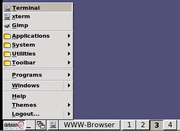IceWM
IceWM is a stacking window manager for the X Window System graphical infrastructure, written by Marko Maček. It was written from scratch in C++ and is released under the terms of the GNU Lesser General Public License.[2] It is relatively lightweight in terms of memory and CPU usage, and comes with themes that allow it to imitate the GUI of Windows 95, Windows XP, Windows 7, OS/2, Motif, and other graphical user interfaces.[2] IceWM is meant to excel in look and feel while being lightweight and customizable.
 | |
 IceWM with Xeyes on Debian Buster | |
| Developer(s) | Marko Maček |
|---|---|
| Initial release | 1997 |
| Stable release | 1.6.6
/ May 29, 2020[1] |
| Repository | |
| Written in | C++ |
| Operating system | Unix-like |
| Type | Window manager |
| License | GNU LGPL |
| Website | ice-wm |
IceWM can be configured from plain text files[2] stored in a user's home directory, making it easy to customize and copy settings. IceWM has an optional, built-in taskbar with menu, tasks display, network and CPU meters, mail check and configurable clock. Official support for GNOME and KDE menus used to be available as a separate package. In recent IceWM versions, support for them is built-in as well. External graphical programs for editing the configuration[2] and the menu are also available.
Usage
IceWM is installed as the main Window Manager for Absolute Linux, Antix and the light version of VectorLinux.
The Easy mode default desktop of the Asus Eee PC uses IceWM.[3]
openSUSE for Raspberry Pi uses IceWM by default as a lightweight GUI. The Raspberry Pi 3 only version of SUSE Linux Enterprise Server also uses IceWM.[4]
Screenshots
 IceWM in action
IceWM in action IceWM, featuring the IceDesert theme
IceWM, featuring the IceDesert theme IceWM's Start Menu is intended to resemble that of Windows 95.
IceWM's Start Menu is intended to resemble that of Windows 95.
See also
- JWM
- FVWM95
- Comparison of X window managers
- Spri, a former lightweight Linux distribution which used IceWM as its default user interface
References
- Github releases
- Saunders, Mike (March 2008). "Lightweight window managers". Linux Format. UK: Future Publishing (103).
- Paul, Ryan (14 November 2007). "Eeextremely Eeenticing: a review of the Asus Eee PC". Ars Technica. Retrieved 2008-06-16.
- http://www.marksei.com/suse-linux-enterprise-server-gains-raspberry-pi-3-support/